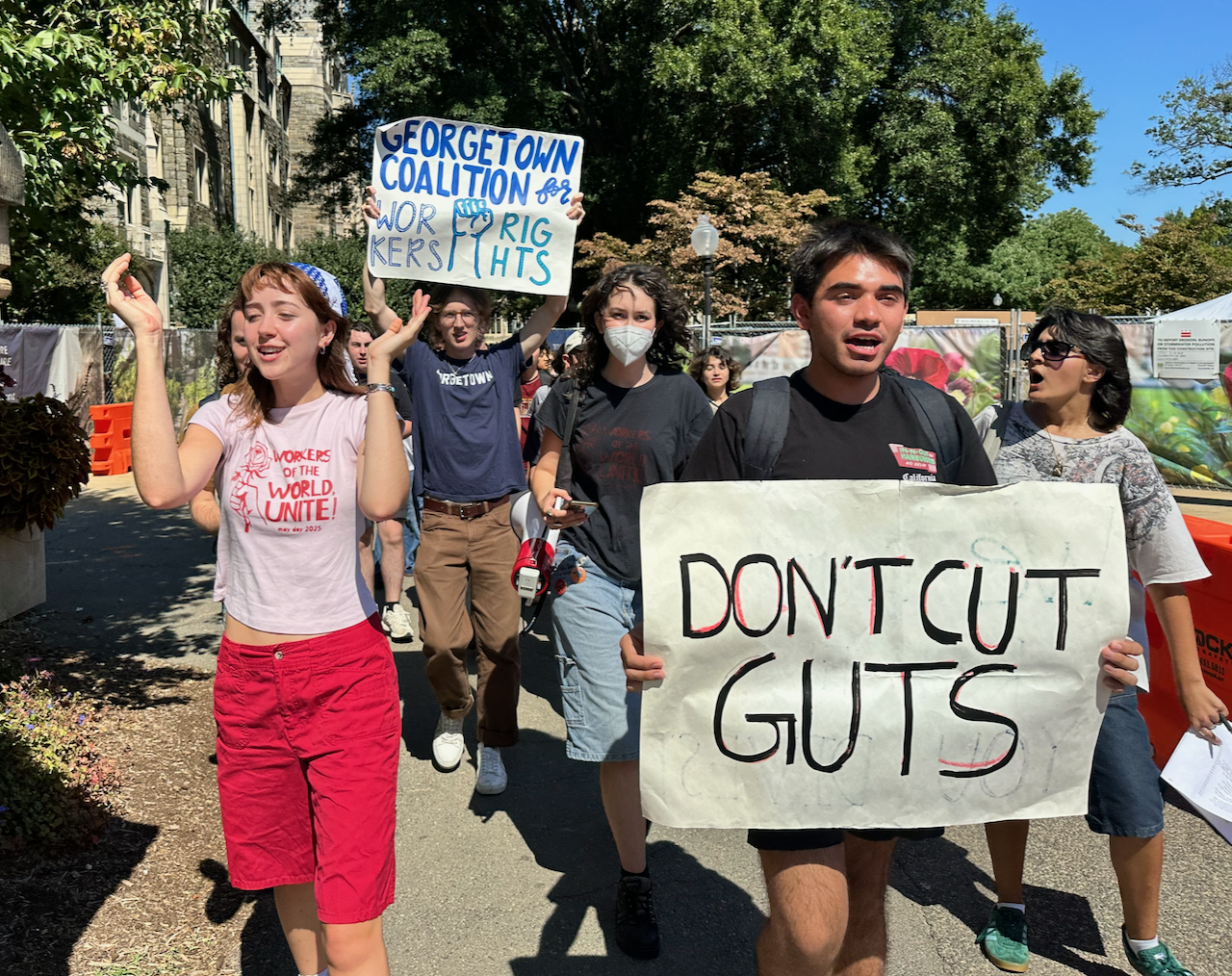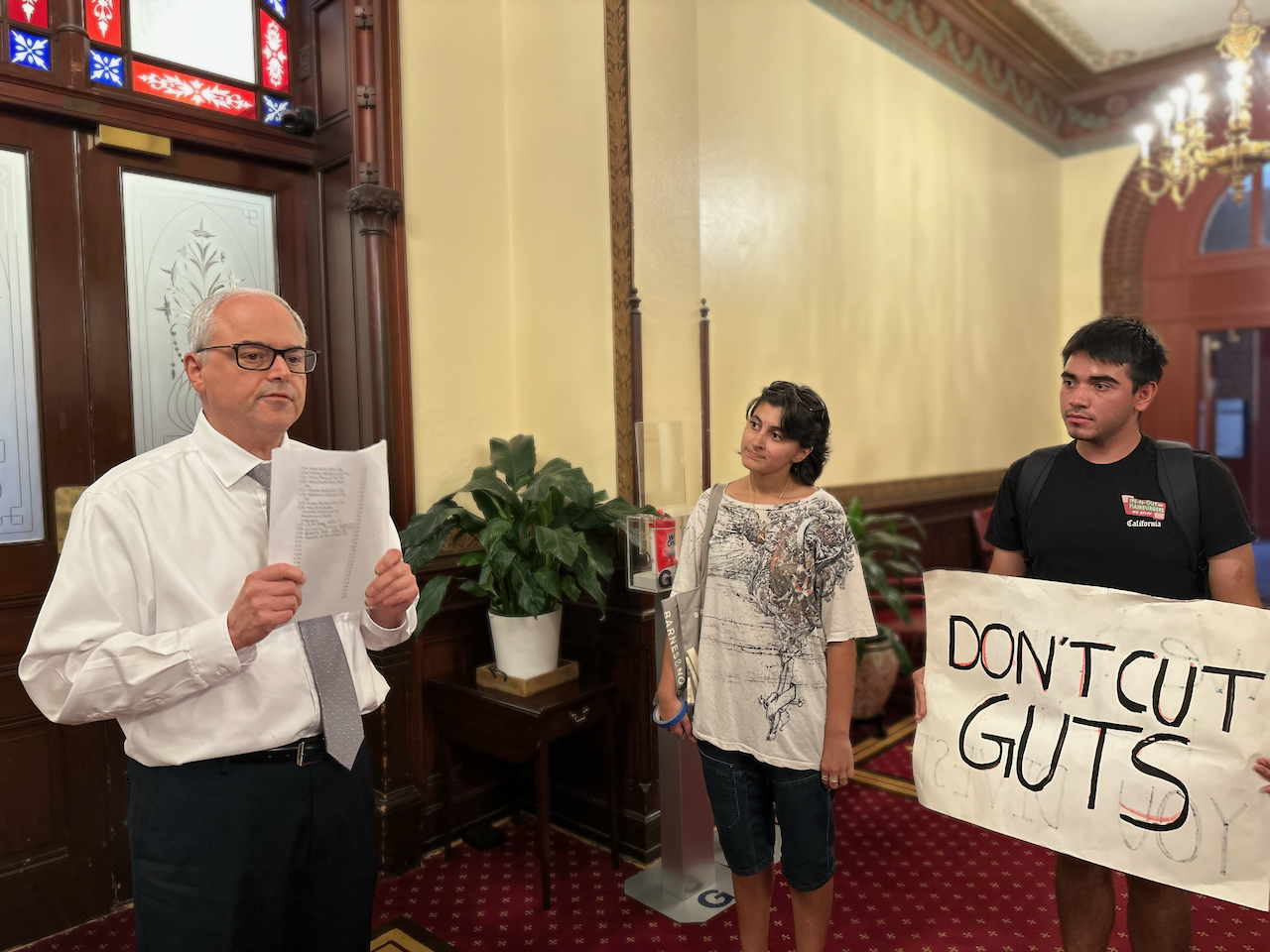Georgetown University will move forward with plans to transfer management of its shuttle service to a third-party vendor after more than 1,160 university community members signed a petition opposing the switch.
The university’s new policy would require Georgetown University Transportation Shuttle (GUTS) drivers to shift to third-party contractor Abe’s Transportation — which would make them no longer university employees — or transfer to another university department, many of which pay less. After the university made the decision Sept. 24, the Georgetown Coalition for Workers’ Rights (GCWR), a student group advocating for labor rights that led the petition, said it would hold another “Week of Action” to place additional pressure on university administrators to reconsider.

The petition, which included 1,130 signatures when delivered to administrators Sept. 19, asked the university to stop pursuing a contract with Abe’s Transportation and maintain its independent bus fleet. GCWR demanded a university response by Sept. 24 and held a rally before delivering the petition to Joe Ferrara, the university’s chief of staff.
In the university’s email response to the petition, David Green, the university’s chief operating officer, said GUTS is an “essential service” for the university that requires third-party management going forward.
“We believe at this time that our best course of action is to partner fully with a third-party provider whose primary focus is on leading and managing bus systems,” Green wrote in the email. “This is an industry that requires true expertise — something we believe is not a core business of a university, especially in a complex metropolitan area like Washington, D.C.”
After reading Green’s email, Noel Tiongson, a GUTS driver, said he did not believe the issues drivers brought up in their previous town halls about the change — including a reduction in benefits and lack of respect from the university — were settled.
“I believe it is a reflection of the administration’s lack of transparency and sincerity to actually do what is proper and fair,” Tiongson wrote to The Hoya. “The Georgetown University community has had a reputation for its civic and societal contribution to the idea of liberalism that is morally guided by doing what is best for everyone.”
Green said the university has endeavored to communicate directly with drivers and is working to “take into account” feedback from the community.
Elinor Clark (CAS ’27), GCWR’s facilities team lead, said GCWR will continue to advocate for GUTS drivers.
“We want to engage as many members of the Georgetown community, beyond just students, beyond just current faculty and workers — we want to engage alumni as well,” Clark told The Hoya.

Green cited university budget constraints and a D.C. law requiring private bus fleets to convert to 50% low-or-zero-emission buses by 2030 and 100% by 2045, echoing previous comments to The Hoya by a university spokesperson. A university spokesperson previously said not moving to a third-party vendor and remaining in compliance with the law would cost $60 million.
Green said the university has already seen the “benefits of an external partnership” because it currently partners with Abe’s Transportation to operate and maintain 35% of buses in the GUTS fleet.
Ariana Hameed (CAS ’26), GCWR’s archivist, said the university is focused on the fleet, not the drivers’ experiences.
“We were expecting some sort of lukewarm response, and that is what we got,” Hameed told The Hoya. “It’s obviously disappointing. They are ignoring the will of over 1,000 members of our community.”
“The GUTS bus is the GUTS drivers — there is no way to separate one from the other,” Hameed added.
One GUTS driver, who was granted anonymity for fear of professional retaliation, said he feels the university is trying to remove drivers who have worked at Georgetown for decades.
“It makes me so depressed after dedicating 14 years of my life here at the university,” the driver told The Hoya. “There’s never been a day when they ask if I can work late and I didn’t say yes.”
“But now, all of the drivers here, we’re hesitant in doing anything now,” the driver added.
The student advocacy comes two weeks after The Hoya reported the shift to Abe’s Transportation could change many drivers’ benefits to more limited offerings, including switching off the university’s expansive health care and retirement packages. Drivers have said switching from the university’s healthcare plan to Abe’s Transportation would reduce their overall coverage, particularly for preexisting conditions.
The drivers will remain eligible for tuition assistance, which covers up to 67% of tuition, for five years, while their dependents will remain eligible for 10 years.
A university spokesperson said the university believes drivers will not experience a significant change in benefits as Abe’s Transportation employees.
“Georgetown is committed to ensuring that any current employees impacted by this transition receive employment with comparable compensation and benefits, unless they accept another position with the University,” the spokesperson wrote to The Hoya.

Fiona Naughton (SFS ’26), a GCWR steering committee member, said students and faculty will continue to fight for GUTS drivers.
“The university wants to just push this under the rug and move on, and they want people to forget because that’s how their reputation is saved,” Naughton told The Hoya. “But people care deeply about GUTS.”
Tanvi Kamath (CAS ’26), another GCWR member, said advocacy must extend beyond the campus in order to protect GUTS drivers, encouraging graduates to apply financial pressure.
“The only thing that moves Georgetown, which really functions as a corporation, is threats to its flow of money or insurmountable public pressure that, beyond just students and faculty, is widespread enough that they’re shamed into oblivion,” Kamath told The Hoya.
Clark said everyone at the university, including students, faculty and staff, should be concerned about the university’s rationale for its plans.
“If the bus drivers’ roles can just be eliminated like that, then what’s stopping the university from coming after more employees, more workers at Georgetown, and subcontracting them out under the guise of saving money?” Clark said.
Clark added that GCWR will continue to advocate for GUTS drivers and other workers on campus, no matter the university’s response.
“Georgetown University cannot make decisions without the consent of the Georgetown community, and we will not stop fighting until our demands are met and Georgetown agrees to keep the bus drivers on as Georgetown employees,” Clark said. “Rallies, petitions, walkouts, flyering all send a message to the Georgetown administration that the community is aware, and the community will not give up.”